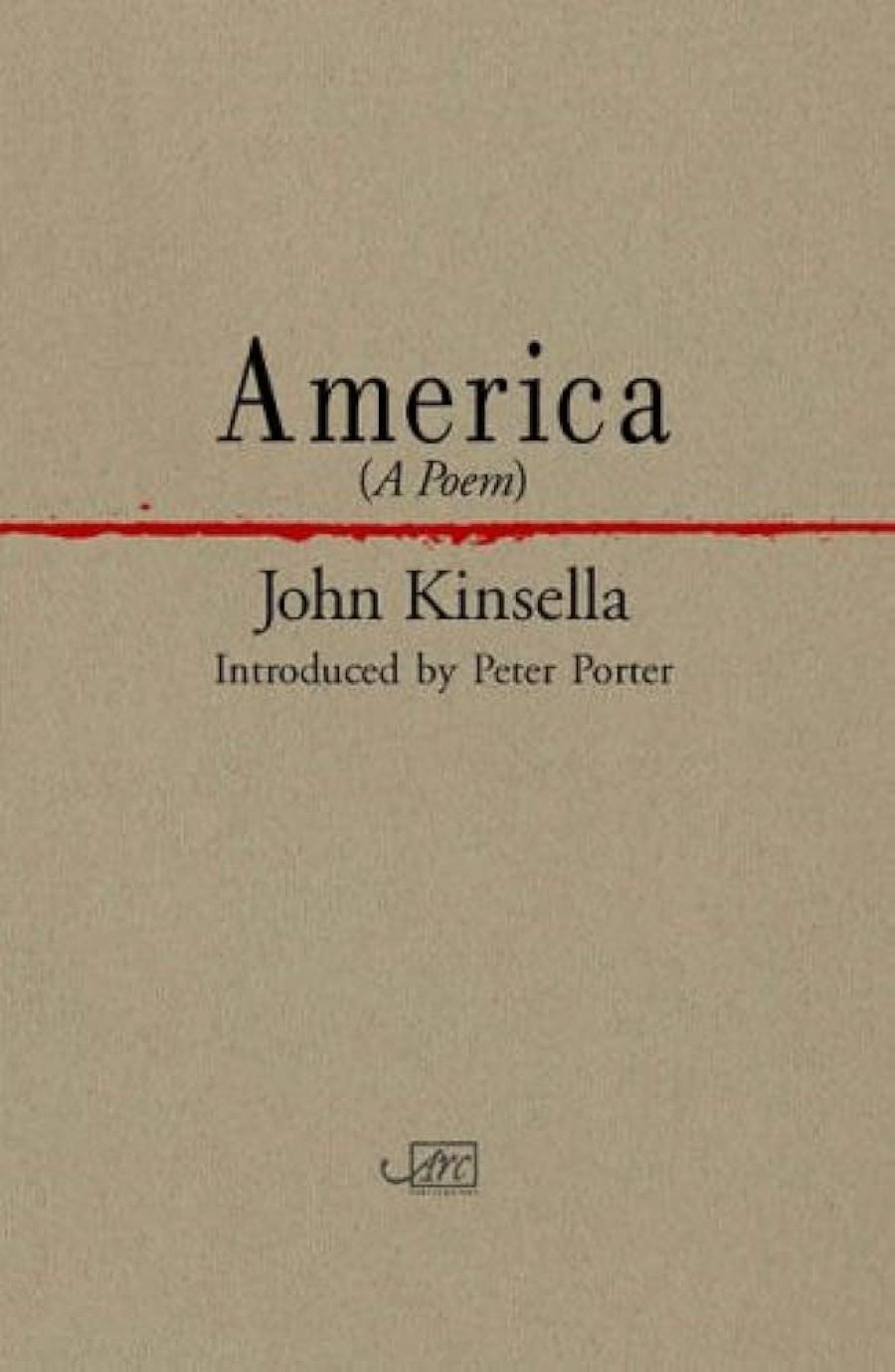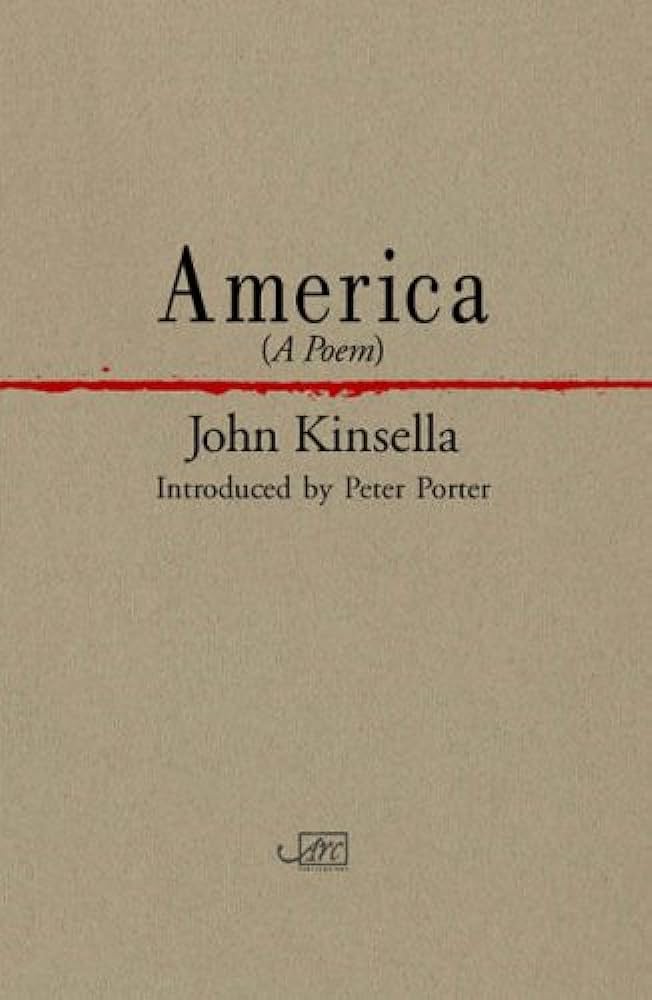
- Free Article: No
- Contents Category: Poetry
- Review Article: Yes
- Article Title: Calls to action
- Online Only: No
- Custom Highlight Text:
Peter Porter, in his introduction to John Kinsella’s new collection, notes that ‘we are all familiar with the surface details of American life. Kinsella does not have to footnote his poem: we recognise his instances immediately … We all speak American.’ Given that Kinsella now lives and works in the United States, Porter also identifies ‘the disillusion at seeing a great exemplar close up’ as one likely catalyst behind the poetic polemic that constitutes this book. Yet it is the surface, the broad impressionistic sweep that we in Australia have absorbed over decades of exposure to American life in our newspapers, magazines, television programmes and popular music, with which Kinsella often engages. One senses that the poet, whether up close or at a distance, would find much about the United States with which to take issue. Nevertheless, his engagement with, and rupturing of, surface in this long poem, or sequence of poems, seems apt. Kinsella smatters the text with allusions to film (ranging from the Marx brothers to Carrie), popular music (George Gershwin to Jefferson Airplane) and numerous other trappings of American life. In doing so, he takes popular culture’s immersion in artifice and turns it against itself.
- Book 1 Title: America Or Glow
- Book 1 Subtitle: A poem
- Book 1 Biblio: Arc Publications, £7.95 pb, 68 pp
- Book 1 Cover Small (400 x 600):

- Book 1 Cover (800 x 1200):

Concerns found elsewhere in Kinsella’s writing to date are here also: Western greed, environmental degradation, indigenous struggles, and war. The most effective poems often use humour, as in his take on American-style brands of Christianity:
God is a fighter
in enclaves of the passive, God is the free
market, God is an extended warranty
on a sports utility vehicle that will
go anywhere …
… God, if not renewable,
is making gestures in that direction
He is similarly perspicacious on freedom: ‘Liberty is a comprehensive health-package / that doesn’t rot your kids’ teeth …’ Here and elsewhere, Kinsella demonstrates his proclivity for incisive juxtapositions. Capitalism marches on ‘as if land not occupied / is a sea sailed by shoes and PCs’, while ‘Out of earshot, / lasers blinded pilots, / drunk with a penchant, / like terrorists, / for instruments’.
Published in a simple format that evokes the political and religious pamphleteering of previous eras, this slender book takes its cue from William Blake’s ‘America a prophecy’. The full title, America or Glow: A Poem, not only affirms the link to Blake (who wrote in 1793 of how the ‘Sullen fires across the Atlantic glow to America’s shore’) but flags Kinsella’s dealings with the ‘melting pot of choice’ that is the contemporary United States. Throughout, the figure of the ghoul hovers in various incarnations: hunter, collector of ‘the souls of abstinent / teenagers’, benefactor of the most abject government policies.
Kinsella is trenchant and often hectoring. While the latter may be defensible in what is in many ways a deliberate, self-conscious rant, the result can be wearing rather than enlightening, the targets obvious:
The cost of sleep in Nikes
damage left by retreating glaciers
soft-celled turkeys
numbskulls belching smoke that chokes
so getting to places
is easier, more weapons
to end things quicker.
Calls to action ensue: ‘whatever the accent, rise up and re-fuse to purchase / their products, refuse to buy more than you need to survive, / reject luxuries, reject sweat-shop bounties / and gun-wracked department stores.’ Relief comes when Kinsella does indeed get ‘close up’ to his subject, as in his carefully observed portrait of an Amish house where the ‘Wood is freshly cut and stacked / in aesthetic architectural cords’. Otherwise, the declarative voice per-sists through to the autobiographical note at the end of the book (‘I am a vegan anarchist pacifist of 16 years …’). There is little doubting Kinsella’s firmly held position on almost any of the issues the text addresses. ‘Capo dot com’ – one of the few titled poems – includes a number of excerpts from a right-wing online publication, Capitalism Magazine, that are so excessive that they require few rejoinders, but re-torts come nevertheless. Elsewhere terms such as ‘doubters’ and ‘All-American’ arrive in inverted commas, presum-ably for fear that the reader might make the unlikely mistake of imagining these to be the author’s own favoured expressions. At one point, Kinsella seems to recap Fahrenheit 9/11: ‘the Bin Laden / family’s close ties to the Bush family and those private jets / out of America straight after 9/11 when no other planes / could fly …’
Lists figure strongly in this work; nearly a full page of ‘Capo dot com’ is devoted to naming more than fifty North American indigenous nations, tribes and communities. The insistent naming and validation seem fitting in what is an overtly political work – but not always: a list of library books the author/narrator has recently borrowed seems de trop.
Grabbing the microphone at the end of this collection, rock musicians prompt in Kinsella a lighter tone. We see Lou Reed, ‘appropriately bitter and pissed-off with interviewers / knowing – or feeling he knows – that he needs to be interviewed’, and Japanese pop with all-girl guitar bands, ‘reason enough for non-revisionist war movies’. A pity that in this incendiary portrait there were not more such examples of free-ranging, even anarchic, wit to ignite the dialectic – less Michael Moore, more South Park.


Comments powered by CComment